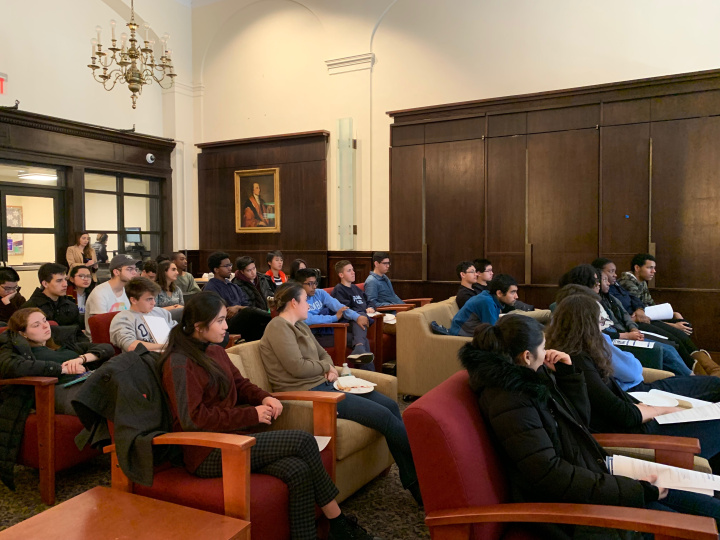These 5 Tips Can Help You Start Planning Your First Summer
Our Spring 2019 Summer Planning for First-Years series kicked off with a student panel the first Friday of classes. Moderated by panel alumna Amaris Benavidez (SEAS ‘19), the panel featured Kai Morsink (CC ‘19), Giselle Valdez (CC ‘20), Sandhya Kaul (CC ‘20), and Kai Tinsley (SEAS ‘19).
Over lunch with 38 first-year students from CC, GS, and SEAS, panelists reflected on their first summer experience and shared how it helped shape their path through Columbia.
ICYMI, we’ve compiled their top 5 tips that can help you plan your first summer!
Tip #1: Not sure where to start? Think about what you already know you like and want to do more of.
This tip, from moderator Amaris Benavidez, is a helpful reminder that reflecting on your previous experience can help you get the ball rolling. In Amaris’s case, she knew she liked working with young people. Her summer RA position at a Center for Talented Youth program ended up galvanizing her interest in residential life and higher education—a passion she now plans to pursue in graduate school.
Another great piece of advice: don’t feel like you have to try out a particular industry or type of work just because you feel like everyone around you is doing it.
If you’re not sure where to start, we recommend our interests and likes/dislikes activities. In career counseling, we can help you connect your reflection activities with ideas for summer opportunities, as well as have a more general conversation with you about your interests and skills you’d like to build.
Tip #2: Take advantage of your resources and networks.
As Kai T. said: Don’t be afraid to ask for help throughout your summer search.
Panelists spoke about how they took advantage of career counseling to narrow the scope of their search and develop a search strategy. They also worked with CCE staff to hone their narrative and create or update their resume.
While of course we particularly appreciated the CCE shout-outs, panelists also shared a number of other resources that helped them plan their first summer.
One suggestion: think about the people in your life who have supported you in the past. Kai M., who wanted to return home for the summer, reached out to a high school teacher to learn about local opportunities. This conversation led Kai to learn about the Junior Fellows Program at the Library of Congress, which he ended up participating in that summer.
Other panelists attended networking events and used LinkedIn to identify Columbia alumni to contact to learn about their jobs and career paths.
Kai T. also recommended investigating pipeline programs for minorities, many of which target first- or second-year students. These educational programs are designed to introduce you to a given industry or company and can help you build community in your area of interest. Plus, they often provide a structure to apply to or interview for further opportunities!
Image

|
Tip #3: Chip away at your search gradually.
You don’t have to tackle your summer planning all at once!
One panelist recommended carving out a set amount of time per week—two hours, maybe—to dedicate to professional development tasks. This could include tasks like:
- reflecting on the skills you’d like to use or hone over the summer
- reading about an industry of interest on CCE industry pages, Vault (formerly Firsthand), or Management Consulted (for consulting)
- setting up a saved search on LionSHARE
- reaching out to people in your network
- drafting a resume
- practicing a few interview questions
By planning career tasks into your schedule in advance, you’ll help break your search down into manageable and achievable steps.
Tip #4: Your summer internship does not define you. Don’t let it.
We really appreciated this reminder from Kai T., and completely agree.
There are so many ways to spend your first summer—and all of them are equally valid. This year’s panelist did research, internships, and worked as RAs, but past panelists have assembled combination summers involving experiences like working at camps, tutoring, traveling, short-term internships, shadowing, or online classes. Many students choose to go home.
And, as Sandhya said, “it’s totally fine to just chill your first summer.”
Tip #5: Whatever you do this summer, it has value for your career exploration and development. We promise.
Some of our panelists absolutely loved their first summer experience, while other panelists … not so much.
Your first summer can help you figure out what you like, and what you want to cross of your list.
“You need to know what you don’t like, in order to know what you like.” -Sandhya
Over their first summer, panelists gained important insight into how a company runs and how their work affected others’ work. They also learned how to communicate their work to people outside their field, to network, to have coffee chats, and to advocate for themselves and their work. For Kai T., the summer helped him develop greater comfort with ambiguity, and how to turn it into something productive.
Giselle described her first summer as “confidence-builder” that helped her “believe in myself and my future dreams in this field.”
We’re here to help!
Planning for your first summer can be both challenging and rewarding, and wherever you are in the process, we’re here to help.
